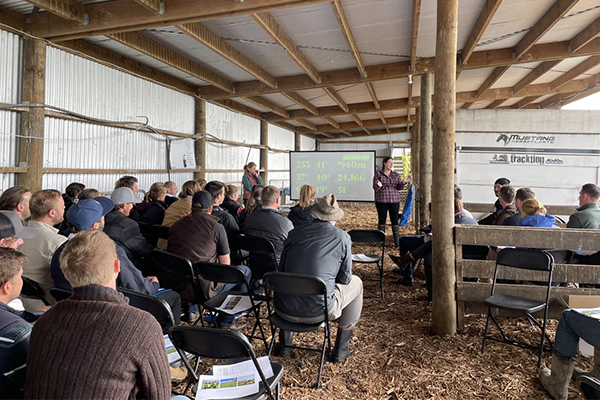Programme helps build Kiwi and Aussie farmers’ management skills
Forty primary producers from across New Zealand and Australia recently spent five days developing their farm management skills at the 2023 Rabobank Farm Managers Programme (FMP).
Now in its eighteenth year, the programme aims to strengthen the operational and strategic skills of farm managers and covers global trends in agriculture, business planning, financial management, leadership and succession planning.
Rabobank New Zealand CEO Todd Charteris said this year’s programme – which was held in Christchurch from 19 to 23 June — marked the first time since 2019 that farmers from both sides of the Tasman have been together in the same classroom.
“Due to Covid-related travel disruptions, we’ve had to run separate programmes in both New Zealand and Australia over recent years,” he said.
“So it was great to have participants from both countries together for this year’s event, and I’m sure all the attendees benefited from the opportunity to mix with their counterparts from across the ditch.”

Programme participants visit Glen Eyre Dairy farm near Hornby
Mr Charteris said the programme took attendees out of their comfort zone and participants came away with a range of new skills that could immediately be applied to their farming operation.
“Participants get to hear from some fantastic presenters on a whole bunch of topics that they may not have had exposure to before. And the classroom teaching is reinforced with a visit to a local farming operation,” he said.
“This year’s visit was to Glen Eyre Dairy Farm near Hornby and provided attendees with the opportunity to hear how improved planning on the farm has helped drive business success.”
Farming couple Mathilde Van Baarle and Wilby Coombes – who manage a 700-cow dairy farm located near Tapanui in West Otago – were two of this year’s programme participants and said they’d decided to do the course with a view towards developing a business plan.
“We’ve spent the last couple of seasons managing my parents dairy farm and the majority of our time has been focused on the day-to-day management of the farm,” Ms Van Baarle said.
“We knew we needed to start spending a bit more time working ‘on the business’, rather than ‘in the business’, and we thought attendance on the programme would be a good lead in to doing a bit more work on our future plans.”
Ms Van Baarle said the succession planning and people management sessions within the programme were particularly relevant for the couple’s current situation.
“The succession planning process we ran through was really helpful given this is a topic we have recently begun to discuss with my parents. And since the programme, we’ve started to have more of an open dialogue with my parents and dig into the detail of what the business succession plan may look like,” she said.
“I also found the people management session really valuable as we’re currently looking to bring on a new farm worker. One of the key things I took away from this session was the importance of hiring people that will help create the kind of team you want. And, as a result, we’ll be a bit more focused on finding someone who has the right personal attributes for the team, rather than being solely focused on the skills they might have.”
Mr Wilby said the programme included some great presenters and had provided him with a wider view of the global agri sector.
“Usually, I’m not that interested in this kind of stuff, but the sessions we did on sustainability and global markets really caught my attention and got me thinking about the relevance for our business,” he said.
“I also really enjoyed the networking side of the programme. I’d expected the majority of participants would be dairy farmers, but there were only a few of us with the rest of the attendees coming from a whole different variety of sectors.
“I also thought it was bloody good having all the Aussie farmers there and getting a better understanding of some of the challenges they’re dealing with.”
Ms Van Baarle said the couple’s FMP management project – which is undertaken by all programme participants in the 12 months following the course – would focus on the their plans for next season.
“It’s still in draft, but what we’re likely to do is pull together a business proposal for the bank that provides details of our current situation as well as share milking and contract milking options for the coming season,” she said.
Mr Wilby said doing the programme together as a couple had several benefits and encouraged other farming couples to consider the programme in future years.
“If you’re both working in the business, it really does make sense to do it together,” he said.
“We’ve come back from the programme with a bunch of new ideas and it’s great that both of us have been exposed to the same information and are on the same page.”
Rabobank New Zealand is a part of the global Rabobank Group, the world’s leading specialist in food and agribusiness banking. Rabobank has more than 120 years’ experience providing customised banking and finance solutions to businesses involved in all aspects of food and agribusiness. Rabobank is structured as a cooperative and operates in 40 countries, servicing the needs of about 10 million clients worldwide through a network of close to 1000 offices and branches. Rabobank New Zealand is one of the country's leading agricultural lenders and a significant provider of business and corporate banking and financial services to the New Zealand food and agribusiness sector. The bank has 32 offices throughout New Zealand.
Media contacts:
David Johnston
Media Relations Manager
Rabobank New Zealand
Phone: 04 819 2711 or 027 477 8153
Email: david.johnston@rabobank.com
Denise Shaw
Head of Media Relations
Rabobank Australia & New Zealand
Phone: +612 8115 2744 or +61 2 439 603 525
Email: denise.shaw@rabobank.com
